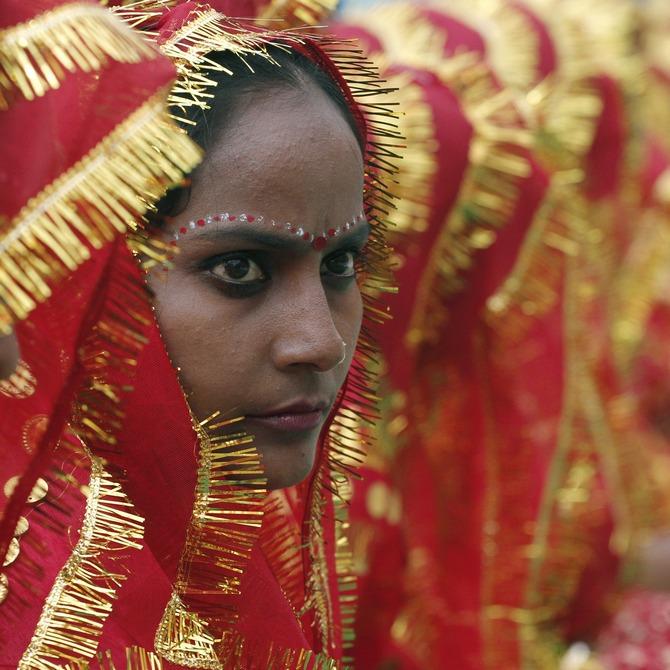
'The idea of an arranged marriage isn't outdated... the way we go about it certainly is.'
'No one grows up dreaming of finding her husband in the matrimonial columns of a newspaper, right?'
'Everyone wants a grand love story, a romance that people will go 'awwww' over.'
Nandini Krishnan, author of Hitched: The Modern Woman and Arranged Marriage shares her insights on how young India perceives the arranged marriage system today.
Chennai-based journalist and playwright Nandini Krishnan explores the dynamics of arranged marriages in the Internet age in her book Hitched: The Modern Woman and Arranged Marriage.
(Read excerpts from her book here and here and purchase a copy here)
The book is an outcome of her interviews with over 30 women and ten men whose marriages have been arranged by their families.
Even though arranged marriages have come a long way since the chai-tray tradition, they remain the last option for many young women and men from urban, westernised India.
But what is it really to be in an arranged marriage set-up? What are rules? Are there any?
How do arranged marriages really work in today's day and age? Do they work at all?
In an email interview with Rediff.com's Abhishek Mande Bhot, Nandini Krishnan provides some answers.
This is perhaps the first book of its kind. With no precedent, what was it like approaching the subject?
Well, it was lovely, because I didn't have to worry about saying the 'same old thing'.
I was a bit worried about how I was supposed to structure it. Should it be in a self-help format or a narrative form or anecdotal? Should it be serious or funny?
I think of myself mainly as a fiction writer, and I've never had to worry about structure while writing stories, or plays, or even the novel I'm working on. The characters find their own dialogues (and) the writing takes a life of its own.
But I was delighted when I found that a similar organic process happens even with non-fiction. I started off with an interview -- the divorcee I've written about -- and when I was transcribing it, I thought about how evocatively she had spoken and that perhaps it should stay largely in her own words, as a stand-alone story.
So, as far as the structure was concerned, I just drew up a list of profiles for women I wanted to speak to, did the interviews, and let it all fall into place.
I thought my editors were going to send me a manuscript I wouldn't recognise, and a lot of feedback on what else the book needed, so I didn't stress about what was lacking or what I may have got wrong. But everyone at Random House who read it liked it, and then I sat back and thought, "Wow, I just wrote a book."
 What prompted you to write about arranged marriages in India?
What prompted you to write about arranged marriages in India?
That's not so much a 'what' as a 'who'.
Meru Gokhale, Editorial Director of Vintage Books India, was the one who came up with the idea. It was a commissioned book. I think she chose me to write it, because when we'd met earlier, I'd spoken about how I'm working on a satire about arranged marriages.
So, one fine day, Meru called me up and said she had an idea for a book, about arranged marriages specifically in urban India, the modern, westernised India that most of us are a part of.
Why do women from this socioeconomic stratum, even today, decide to have arranged marriages?
Are they tired of waiting for the right guy? Are they disillusioned? Or does parental, or societal, or peer pressure make them succumb?
It took me about five minutes to realise that at least twenty women I know, and know well, had had arranged marriages when they were not yet 30, and some not yet 25.
I guess it's always nice to have a bahaana (an excuse) to satisfy one's curiosity. Don't you think?
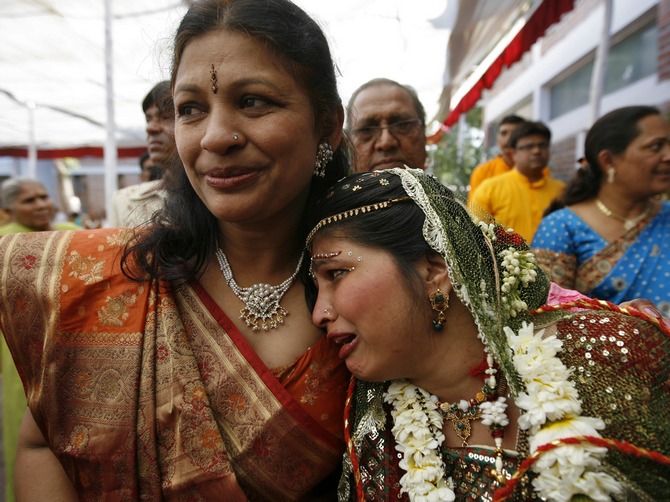
To me, the book had a 'Chicken Soup' feel to it. Was that the intention?
Whaaaaa...?! NO! Ugh, I can't stand that series. I thought there were enough depressing stories in my book.
I know there were a couple of mushy ones in there, and some which made it sound like climbing the Everest was easier than dealing with clothes strewn on the floor.
But, no, I don't like happy stories at all. I especially hate all those overcame-the-odds ones.
It's so irritating to feel obliged to act all wide-eyed and awed and inspired, when actually, you're thinking, "So, one person out of seven billion wanted to make the most of a few decades. Whatever."
You really thought it read like Chicken Soup? I want to kill myself. And no, I won't blog about how I overcame suicidal tendencies.
There are some very intimate details involved in the book. How difficult was it to ask those intimate questions to get those details?
How open were these young women and men in responding to them? (I notice you've thanked someone for pushing you to ask those intimate questions. Is there a story behind that acknowledgement?)
The person I've thanked was my mother's younger sister, who was the best aunt any kid could have.
She was the only adult who wouldn't gasp or ask me to, as my Autocorrect says, shut the duck up, when I asked why these women in advertisements kept pouring ink on sanitary pads, and if storks bring babies, how do they get into the stomachs of the mothers, and if they are in the stomachs, where does the food go, and how do they come out of the stomachs without the mothers dying (because, clearly, the movies show us that one poke with a knife could kill you instantly), and whether only foreigners have sex.
Oh, and also, how and why do people have sex -- do they stroke backs wearing red nail paint like the lady in the AIDS awareness ad Doordarshan was airing? You get the picture.
Well, as for getting those intimate details out, everyone seemed okay talking about their marriages.
That really surprised me, because I get very annoyed when people ask questions like, "Aww, how did you guys meet?"
It was more difficult for me to ask the questions than for my interviewees to answer.
My bigger challenge was, since many of these people are close friends of mine, they would forget that they were speaking to me-the-journalist, not me-the-friend.
I kept asking whether they're comfortable about this being in the public domain. Of course, most of the names are changed, so it made things easier.
What were the reactions of the parents you spoke to like?
I did speak to some parents, but that was just to fit their perspectives into the sections of the book that deal with issues that come up in a marriage -- like these disguised avatars of dowry, or living with in-laws, or caste.
Most of the parents are quite chilled out, because families in the sort of milieu I was looking at for the book tend to be liberal.
Most of them were happy I was writing a book, and the first thing they wanted to know was 'So, are you speaking in favour of arranged marriages or against?'
They didn't see how I could not take sides. They also didn't see why our generation doesn't see that they're always right.
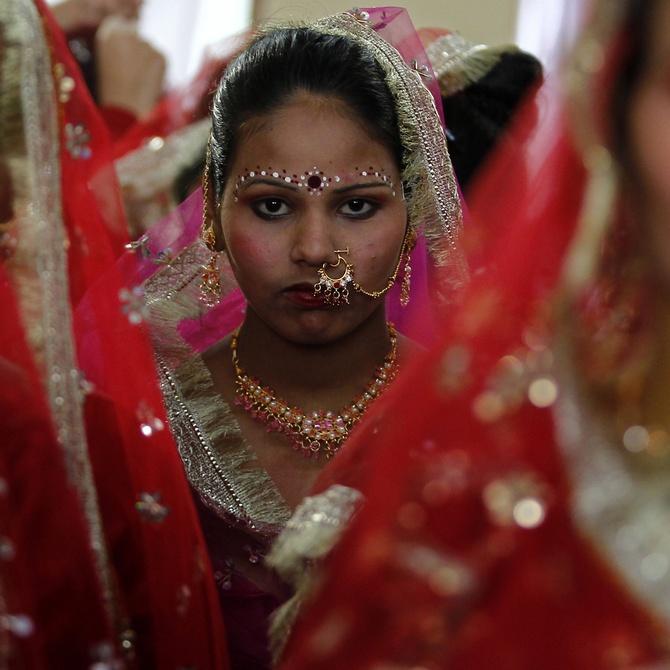
How does our parents' generation perceive love/arranged marriages?
I actually know some parents who have had love marriages, and whose children have had arranged marriages. I don't think it matters to them how someone gets married, but they are very anxious that people get married "by a certain age".
I think it takes a few divorces in the family, or among the friends of their offspring, to convince them that it's more important to marry the right person than at the supposedly right 'time'.
The one thing parents really struggle with, though, is the idea that a marriage can also be arranged by you. You know how we speak about the kind of man or the kind of woman you can take home to your parents? Obviously, that means you're ticking off a checklist in your head, right?
I had particular grief trying to explain to my own mother that this guy who was really anxious to marry me, and whom I was kind of dating, was not someone I was 'in love' with.
It was just that his CV and his accent were marginally better than the ones "concerned" relatives were throwing at me.
To them, there are only two categories for marriage. An 'arranged' match is someone you met through them; a 'love' match is someone you didn't meet through them.
How has the perception of arranged marriage changed for our generation?
We're rather snide about them, (aren't we)?
It's also that arranged marriage was the norm for our parents' generation, and to honest, they had a larger pool of eligible people to choose from, because it was the norm.
Also, the caste criterion did make sense at the time, because a few decades ago, caste circumscribed one's way of life -- what you ate, what language you spoke, your tastes, your interests (etc).
(Today) the caste doesn't govern who you are anymore.
So, to answer your question, while the idea of an arranged marriage isn't outdated -- I mean, really, how different is it from speed-dating or dating websites in the West -- the way we go about it certainly is.
I think our generation understands that.
But the offshoot of that is the idea that all arranged marriages are forced. And that the women, by implication, are doormats who don't have the brains or willpower to 'rebel'.
No one acknowledges that they have a right to choose how they get married.
What if you don't want to marry someone from the same field? Or, what if you haven't met anyone you like? Why is it wrong to give the arranged route a fair chance?
I read a review of my book in which the reviewer clearly hadn't got the book. She hadn't even engaged in the book, so much as hated on arranged marriage, calling the women who "agreed" to these, "wimps".
I think it's dangerous when people who consider themselves liberal or feminist get all judgmental. Sort of like, you know, with karva chauth, people act like women who do it are nincompoops.
Obviously, no one in this milieu believes that the moon or fasting is linked to longevity. Some people just like doing these little wifely, traditional things -- it's like playing a fun role -- and they have a right to do it, don't they?

Many young women and men I've known of see arranged marriages as the last resort. What contributes to this perception, according to you?
I think, because it mostly is. No one grows up dreaming of finding her husband in the matrimonial columns of a newspaper, right? Everyone wants a grand love story, a romance that people will go 'awwww' over.
And even now, after writing the book and knowing that there can be happy arranged marriages too, my first reaction when someone who seems normal tells me that he or she had an arranged marriage is to wonder why. And why so soon?
Maybe it's the way romance is treated in our art forms. In fact, the only instance I can think of in literature where arranged marriage was romanticised is RK Narayan's The Bachelor of Arts, and its sequel The English Teacher.
In all our movies, the heroine leaves some eligible, usually loaded, guy whom her parents have found for her to run away with a vagabond who's, like, 14 going on 40.
It's also that, honestly, it can get rather embarrassing. One of my interviewees, a friend of mine who's perfectly happy now, spent the four months of her engagement mostly convincing all of us that she wasn't daft.
To me, it always seemed like an admission that you couldn't find anyone likeable, or interesting, or sensible, who found you attractive. I'm not saying this is the right perception. I'm just being honest.
How did you go about choosing the people you wanted to interview and feature in the book?
I had a sort of grid in my head. I wanted to look at all kinds of marriages -- happy ones, unhappy ones; late marriages, early marriages; inter-caste marriages, marriages between Indian-bred and NRI people; marriages that involved moving cities, or countries, or changing lifestyles in some way.
I also wanted women from different cultures across the country, different religions, different ages, different professions, and who have had different kinds of experiences.
Like, I needed people who haven't been able to have children, to ask whether they feel any resentment against the spouse, or guilt at depriving the spouse of parenthood; I wanted to speak to women who have gone back to study and work after having children; women who have left bad marriages, who have chosen to stay on; couples who have great chemistry, couples who don't; people who have dated others before having an arranged marriage.
Basically, the whole spectrum.
And this was all possible, because I was looking at a very small social class.
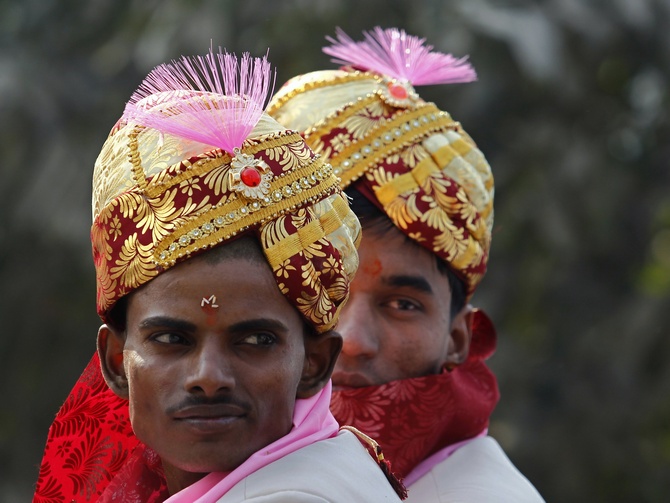
Some of the people featured in the book are known to you. What about the others? How did you reach out to them? How difficult was it to convince them to be interviewed?
Well, a lot of them are known to me. And the thing is, with a book like this, trust between the author and the subject is crucial. You can't just walk up to someone on the road and say, "So, listen, did you have an arranged marriage or love marriage?" And you can't hang around family courts, hoping to catch a divorcee who's in the mood to bitch.
Also, I needed people who could articulate their experiences properly.
Thankfully, I found people who fit some of the profiles in my grid among my friends. And I would ask around for others.
For example, I wanted to speak to a Bharatanatyam dancer or Carnatic musician who's had an arranged marriage.
So, I asked a dancer friend whether she knew anyone who would be willing to talk to me. I asked NRI friends whether they knew people who had grown up in the West and married people raised in India.
In some cases, I looked up internet forums, and sometimes posted a message, or contacted somebody whose email was on it, to ask about specific issues.
I've done this quite often while working on stories, especially tricky subjects like LGBT issues or sexual abuse. Obviously, the people who write back to you are willing to talk.
I didn't really have to convince anyone. Like I said, most people were quite happy, even eager in some cases, to discuss their marriages.
But I needed to make sure they were comfortable, that they knew they could trust me. I've been quite lucky with that.
Maybe people instinctively know that I'm not the kind who would exploit them, or use something without their permission.
Or, they feel like opening up to me for some strange reason. I don't know. I'm not a very open person, I don't like discussing my personal life, so I can't understand how or why they agreed to this.
Now that you ask, maybe I was so apologetic in my emails and conversations, saying things like, "I'm really sorry if any of these questions should happen to offend you, or seem intrusive. Please feel free to leave any out", that they actually felt sorry for me.
Did you receive any harsh/negative feedback from the people you interviewed?
No. I told all of them I was going to record the interviews, but that they would take the final call on whether something had to be left out. And these interviews happened over several months, so the conversations would often meander into diversions, which were often interesting.
Sometimes, they were pretty shocked at how much they had said, and how easy it would be to identify them.
So, we'd do some back and forth. Sometimes, I'd negotiate, and say, "Fine, so you don't want me to put this in. But can I keep what you have said in another section of the book where I'm discussing this particular issue, and keep you anonymous?"
One of my friends did mail me saying, "Wow, you've just used everything I said. It's this easy to write a book, eh?" But it wasn't a serious jibe.
Most people I know are polite to a fault. As you can see, that worked out rather well for me!
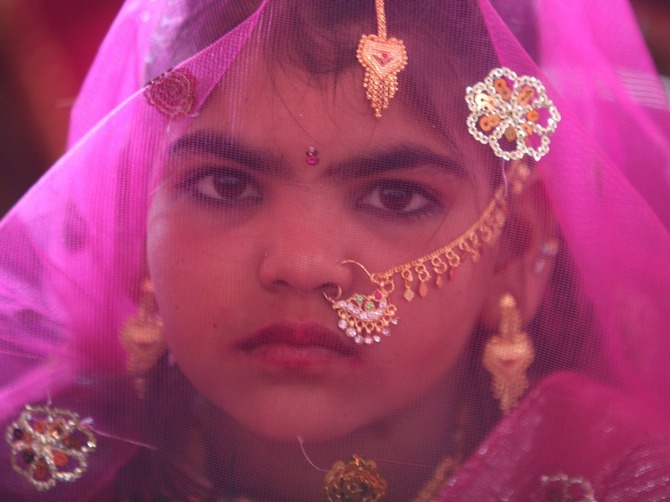
Were there stories that didn't make it to the book?
There was one story I dropped because I knew the interviewee was lying through her teeth.
I had offered to keep it anonymous, but she wanted to use her real name and dress up her marriage. I knew her, and she'd told me about problems in her marriage earlier.
So, I was bewildered when, in the interview, she spoke as if everything was rosy and she was the happiest woman in the world.
I felt sorry for her, because it's horrible to have to lie to yourself. But I couldn't use a false story, so I told her that knowing what I did about her marriage, I couldn't in good conscience write this.
If she wanted to tell me the whole story under a pseudonym, that was fine, I didn't want to ruin her marriage anyway. Or, I would have to drop it altogether.
With some others, there were repetitions, and they weren't telling me anything worthy of a separate chapter; but they did make interesting points, and I fit those into other sections of the book.
You have two very interesting and diverse stories of women who've married young. As a generation we seem to have been told that marrying young is a bad idea. What are your thoughts on this?
I think it is a bad idea. You hardly know who you are before you hit your late twenties. How do you deal with another stranger?
My mum married relatively late, and she thought it would be a good idea for me to marry early, so I could "grow with the other person".
The way I see it, unless you really are putty, looking to mould yourself in the image of someone else, you can't "grow with' someone.
You will eventually become who you are, and grow resentful of whoever talked you into an early marriage.
It's a huge risk, and if it works out, you're lucky. If it doesn't, things get ugly, because without work experience, without solid expertise in some subject, without support, it becomes very hard to leave a marriage.
And, when you're 30, you may feel sorry for the 'child' you were at 20, and begin to hate everyone who 'put you through this'.
I think the ideal time to get married is when you know how your career is headed, and what you want from life.
But I'm also a narcissist, who thinks the ideal person to marry is someone who's exactly like you, with the odd improvement.
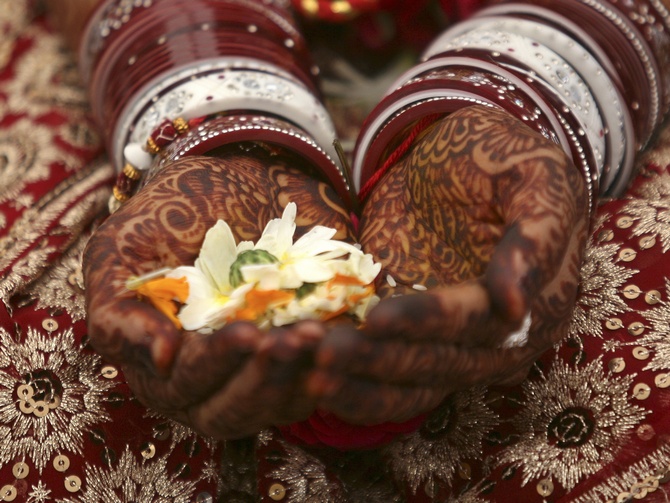
You've been through arranged marriage experiences yourself. Could you be so kind as to perhaps share them with us? Do you think you will ever go down that road?
Ah, to answer that question would need me to reveal my relationship status, and not even Facebook has wheedled that out of me. Sorry, I'm a very private person, at least about certain things.
But I can tell you about the arranged marriage experiences. See, I got into this whole thing because my mum thought I might be happy marrying early.
Until I was 21, the only men I met were IIT-ians who would all hit on me with this one bizarre line which they considered a pick-up: "Okay, let me give you a question -- The Holy Roman Empire was neither holy nor Roman nor an empire. Discuss." I'm serious, this isn't figurative.
So I thought, 'How much worse can the guys my family finds be?'
I would find out -- one gave me missed calls to save money; one thought Orhan Pamuk was a book; one had lines of powder caked on his neck; one had a moustache (no civilian should be allowed to have a moustache).
Also, the older I got, the shallower I got. I'm really shallow. I judge books by their covers.
And the way I see it, you can turn to other people for conversation, but how can you sleep with someone you find unattractive?
At the grand old age of 23, I put a stop to the search. Some years later, I started writing a satire.
What next?
Well, it should have been that satire, but I don't want to become a marriage specialist.
It's bad enough that, being a woman writer, you're always thrown into some panel where everyone else wants to castrate and kill men, and you're expected to whine about how women are not taken seriously in any profession, without realising that if you take yourself too seriously, no one else is going to.
I'm working on this other novel, while I take a break from the idea of marriage -- this one is about consensual incest (and not sexual abuse).
 While doing my research for an article, and subsequently for this novel, I saw just how widespread it is, and how so many people who are involved in these unconventional relationships are in severe depression.
While doing my research for an article, and subsequently for this novel, I saw just how widespread it is, and how so many people who are involved in these unconventional relationships are in severe depression.
They have no one to turn to. People get judgmental, they find it 'gross', they try to convince them that they have been abused. It's very sad.
I've never been in an incestuous relationship, so I'm coming in from the outside while looking at that subject too.
This is fiction, but I do need to do some research.
You can purchase a copy of Hitched: The Modern Woman and Arranged Marriage here!